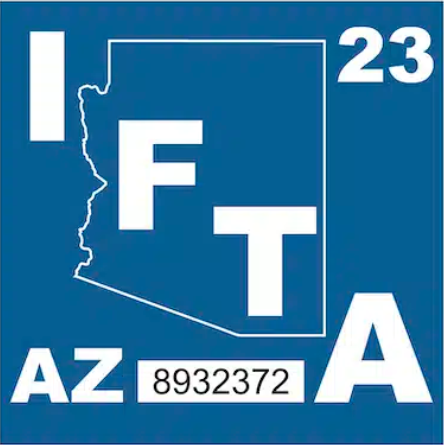Table of Content
- What are the Reporting Periods?
- The Advantages of IFTA for Drivers
- How Does it Work?
- Understanding IFTA Requirements
- What Vehicles are Covered?
- How Truckers Monitor Their Mileage
- Telematics: Streamlining Reporting Through Diverse Approaches
- How GPS Insight Enhances Efficiency
- Potential Consequences for a License in the Worst-Case Scenario
- How to Drive More and Manage Paperwork Less?
Enter IFTA – the International Fuel Tax Agreement. “What is a IFTA?”,you might wonder. IFTA is a cooperative arrangement between the lower 48 states of the United States and the Canadian provinces. Its purpose is to simplify and standardize the way truckers and trucking companies manage fuel tax payments, especially when operating across multiple jurisdictions.
Now, let’s delve into “What is IFTA taxes?” IFTA taxes specifically pertain to the fuel taxes paid under the International Fuel Tax Agreement. By leveraging IFTA, truckers can efficiently calculate and report their fuel taxes, alleviating the burdens associated with this financial responsibility.
For those engaged in the transportation industry, understanding “What is IFTA for trucking?” is crucial. IFTA for trucking serves as a fundamental tool, streamlining the reporting and payment processes for fuel taxes when traversing different states.
To partake in this agreement, truckers necessitate an IFTA fuel tax license. This license is the key to compliance with IFTA regulations, enabling truckers to report and pay their fuel taxes to a single base jurisdiction. This base jurisdiction then effectively distributes the funds to the appropriate states or provinces. So, What is an IFTA fuel tax license? It is the authorization that empowers truckers to adhere to IFTA regulations and efficiently manage their fuel tax responsibilities.
In the past, the payment of fuel taxes was a time-consuming task, compelling truckers to halt at a port of entry to procure a permit. The revenues generated through IFTA play a pivotal role in upkeeping the roadways essential to everyone. Given that heavy commercial vehicles significantly contribute to wear and tear on these roads, IFTA ensures a just system for collecting funds to support road maintenance.
What are the Reporting Periods?
Licensees under the fuel tax agreement are obligated to submit reports on a quarterly basis. The reporting periods are as follows:
- January to March (Reports due by April 30)
- April to June (Reports due by July 31)
- July to September (Reports due by October 31)
- October to December (Reports due by January 31)
The Advantages of IFTA for Drivers
It’s safe to say that not many truck drivers entered the profession due to a passion for paperwork. Thanks to the International Fuel Tax Agreement (IFTA), drivers can now breathe a sigh of relief as it significantly reduces the burden of tax-related paperwork. This translates to time savings, improved compliance, and a reduction in errors.
Before the implementation of IFTA, truckers and trucking companies faced the challenge of dealing with multiple jurisdictions to fulfill fuel tax obligations. The regulations in different regions often contradicted each other, leading to stress for everyone involved. Truckers had to acquire fuel tax licenses for every state they traversed. The transition to a single permit simplified their paperwork considerably.
In addition to the time saved and simplified paperwork, IFTA brings financial benefits. Compared to the varying durations of temporary permits and the fragmented process of obtaining them, the cost could quickly surpass that of paying the fee charged by one’s home state for a fuel tax license.
How Does it Work?
To comply with the International Fuel Tax Agreement (IFTA), drivers must diligently record both their fuel consumption and the distance covered in each applicable jurisdiction, including states, territories, and provinces. Quarterly, businesses submit reports based on this information, and the resulting tax revenue is distributed among the participating jurisdictions.
This arrangement benefits member jurisdictions by ensuring sufficient funds for the maintenance of roads heavily used by commercial vehicles.
Annual license renewal is a requisite, and quarterly reports must be submitted, even if operations were exclusively within the home state.
It’s crucial to note that IFTA pertains not to individual drivers but to the trucks or power units they operate.
Understanding IFTA Requirements
To comply with the International Fuel Tax Agreement (IFTA), the initial step involves completing an application. This application process is initiated through your base jurisdiction or base state. It is applicable to owners or operators of a Qualified Motor Vehicle (QMV) engaged in travel between two or more jurisdictions in the United States or Canada. QMVs are characterized by having two axles with a gross vehicle weight exceeding 26,000 lbs, possessing three or more axles, or a combination of both.

Subsequently, it is imperative to affix an official IFTA decal or sticker to your truck at all times. Compliance also entails the submission of a completed report every 90 days, coupled with the timely payment of all IFTA taxes due.
Ensuring the accuracy and accessibility of your historical records is crucial. IFTA mandates that drivers maintain all fuel tax records for a minimum of four years. Your office should have these records readily available, and you must grant DMV auditors access to your records upon their request.
What Vehicles are Covered?
The graphic below shows what vehicles fall under the specifications.
How Truckers Monitor Their Mileage
Tracking mileage for the fuel tax agreement is commonly achieved through two methods: smartphone apps and trip sheets. The use of smartphone apps is widespread and relatively straightforward for many qualified motor vehicle operators. Despite the simplicity, it’s crucial to input comprehensive information due to the intricacies involved.
Trip sheets, on the other hand, hearken back to the bygone era of long-haul trucking, living up to their name as drivers manually enter information into designated fields. In acknowledgment of the 21st century, there’s now an electronic version available. Whether in paper or digital form, trip sheets inherently pose a higher risk of errors compared to modern methods that automate the final calculations, relieving drivers of that responsibility.
Telematics: Streamlining Reporting Through Diverse Approaches
Telematics, the system for transmitting data over long distances, extends beyond mere GPS tracking, offering multifaceted solutions. Fleet managers leverage telematics devices to formulate strategies aimed at reducing fuel and labor costs, enhancing fleet safety, and elevating customer service.
Modern telematics solutions provide comprehensive information on a diverse range of vehicles, capturing a wealth of data. For instance, our solution can monitor the individual temperatures of refrigerated trailers, promptly notifying fleet managers of any fluctuations that might jeopardize the integrity of products in transit.
The integration of a fleet telematics solution further simplifies IFTA reporting. Telematics can furnish detailed reports on driver and vehicle information, location, date and time, as well as the quantity of fuel consumed. This empowers motor carriers and commercial vehicle operators to discern the miles traveled in each state per vehicle, along with the total fuel cost and consumption.
By utilizing telematics, drivers are relieved of the reporting burden, allowing back-office staff to effortlessly generate scheduled or on-demand reports with just a few clicks. This not only reduces paperwork time but also enhances the accuracy of the reports.
While many trucks already feature telematics devices, such as Electronic Logging Devices (ELDs), it’s essential to note that not all ELDs capture the requisite data for fuel tax agreement assistance. Some services may retain data for only six months, falling short of the necessary four-year requirement, emphasizing the importance of choosing devices that align with your reporting needs.
How GPS Insight Enhances Efficiency
Numerous companies turn to telematics devices like GPS Insight to save both time and money, recognizing the crucial role time plays in virtually every business. Telematics solutions contribute to time savings through various means:
- Improving Routing: Optimizing routes for efficiency.
- Reducing Idle Times: Minimizing vehicle idling for enhanced fuel efficiency.
- Automating Mileage Logs: Streamlining the process of tracking mileage.
- Simplifying Compliance: Ensuring adherence to regulatory requirements effortlessly.
- Tracking Maintenance: Monitoring and managing vehicle maintenance schedules.
In conjunction with the GPS Insight solution, the State Mileage report is among the various reports available for extraction. This report consolidates essential fuel tax data, providing a time-saving tool for both drivers and back-office personnel.
Potential Consequences for a License in the Worst-Case Scenario
Beyond financial penalties, IFTA members face the risk of losing their fuel tax agreement license under certain circumstances. License revocation typically occurs for failure to pay taxes, neglecting to file fuel tax reports, or non-compliance with the record-keeping requirements outlined in the agreement.
In such situations, leveraging technology becomes invaluable to maintain operational order. A reliable fleet management solution proves especially beneficial when precision and efficiency are paramount.
How to Drive More and Manage Paperwork Less?
Logity Dispatch team specialists ensure accurate and efficient IFTA reporting for you. Personal dispatchers facilitate organized record-keeping, reducing the likelihood of errors and ensuring compliance with tax regulations. With Logity Dispatch, owner-operators can optimize their paperwork management, saving time and resources, and enhancing overall operational efficiency.
Furthermore, understanding the requirements for IFTA is crucial for maintaining compliance and avoiding potential consequences. Owner-operators should be aware of what is an IFTA report and how to calculate IFTA tax to ensure accurate and timely submissions. Knowing when IFTA is required is essential for staying ahead of regulatory obligations. By staying informed and utilizing tools like Logity Dispatch, owner-operators can navigate the complexities of IFTA seamlessly, ensuring compliance and avoiding penalties.
Contact us today to forget about the paperwork headaches!







